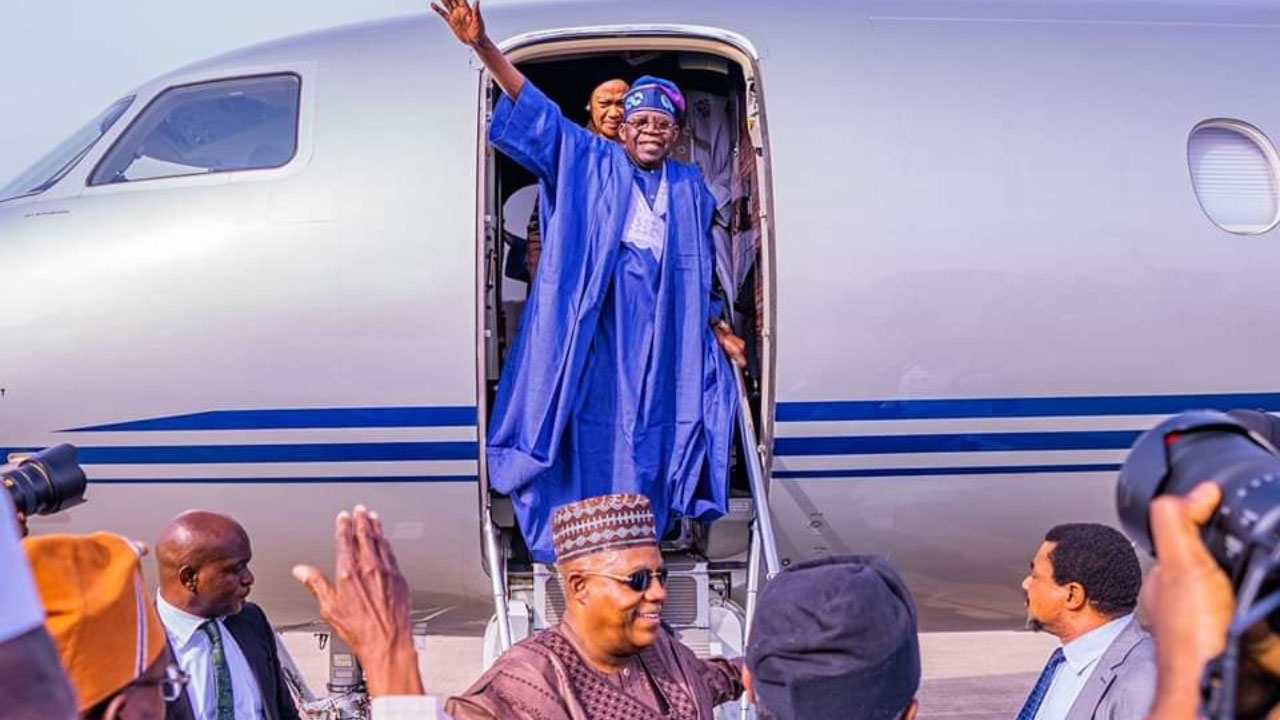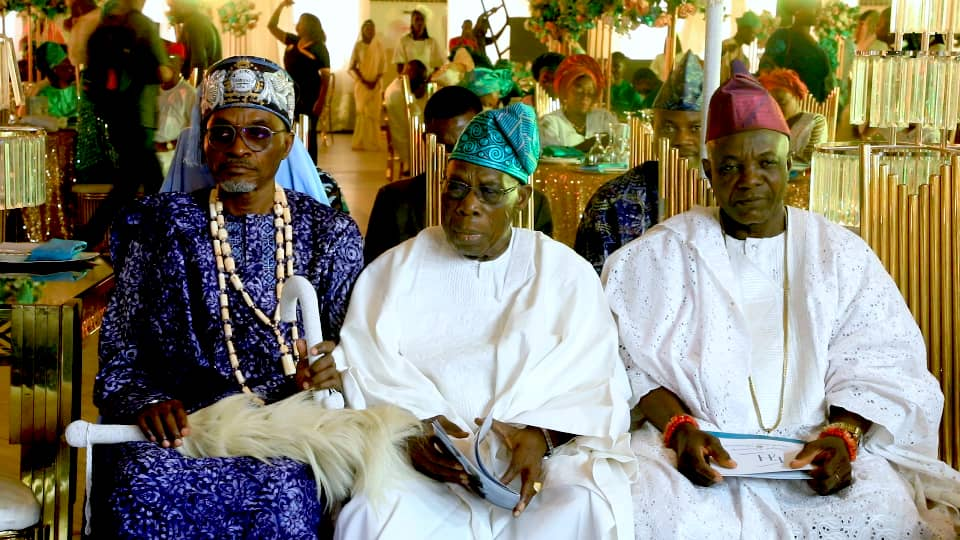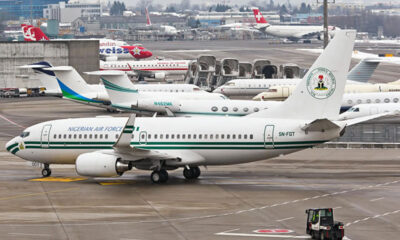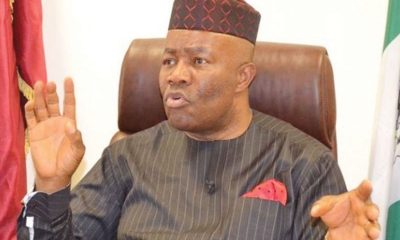Uncategorized
Nigeria’s President has 10 planes British, Singaporean PMs have none

Nigeria’s President has 10 planes British, Singaporean PMs have none
By Eric Teniola
This piece was first published in Vanguard on April 28, 2015, by Eric Teniola who is a former Director in The Presidency and lives in Lagos UNTIL 1999, the Presidential Air Fleet (PAF) was under the control and supervision of the Secretary to the Government of the Federation (SGF).
Before then, senior Air Force officers, in their grey-upon-blue well-ironed uniforms, were seen on the eleventh floor of the Federal Secretariat which was then the office of the SGF, hanging around.
The argument was that since the Chief of Staff was the head of the staff attached to the President and since he was aware of the hourly movement of the President, he was in a better position to control the fleet adequately.
I understand the fleet is now under the National Security Adviser.
Before 1999, the fleet was almost dormant for lack of use.
General Ibrahim Babangida (82) hardly travelled outside the country except to visit some states and Chief Earnest Oladeinde Adegunle Shonekan (now late), whose tenure lasted less than 100 days, made use of the fleet only once when he attended the Commonwealth Conference outside Nigeria. The second time he used the fleet was when he was overthrown and brought down to Lagos in company with Chief Dapo Sarumi (also late).
General Sani Abacha (late) hardly travelled outside Abuja. In fact, during his era, pilots attached to the Presidential Fleet complained of under utilisation, raising fears that they might lose their licences for not flying enough.
In 1997, Abacha made only five trips outside Abuja, and, in 1998, he made three trips; the fourth would have taken him to Ouagadougou in Burkina Faso on June 8, 1998 for the African Union Conference, the very day he died.
General Abdusalami Abubakar, who spent less than 11 months in office, was too busy with his transition programme that he hardly travelled.
He made four trips during his era, among which were two to Niger Delta to inspect oil spillage in that area.
Flying President
As for President Olusegun Obasanjo, the Jagunmolu of Egbaland, he was a flying President. Even till date, when the Presidential Fleet is outside his control, he is still flying around the world.
He loves to fly. That is the way he is. And the pilots attached to the Presidential Fleet loved him for that.
The Presidential Fleet remains today the most important posting in the Nigerian Air Force.
For example, Chief of Defence Staff, Marshall Alex Badeh (late), was an officer of the Presidential Fleet, as he flew former Vice-President Atiku Abubakar between 1999 and 2007 several times.
Even the ex-Chief of Air Staff, Air Marshal Adesola Amosu, was an officer of the Nigeria Presidential Air Fleet too.
The fleet is among those with the largest number aircraft in the world in comparison to other countries.
Who has what?
The British Prime Minister has no presidential aircraft.
Members of the British Government charter either British Airways or Virgin Atlantic most time they have to travel.
The government of Tunisia operates a Boeing 737 BBJ.
An Airbus A340-500 has also been purchased and VIP configured, but was never used for travel and has been stored since 2011 revolution that ousted former dictator Ben Ali.
The Tunisian government is reportedly trying to sell both aircraft.
The government of Algeria operates an Airbus A340-500.
The Chief Executive of Hong Kong travels in commercial aircraft, usually operated by Cathay Pacific.
He travels in helicopters operated by the Government Flying Service.
The Ivorian government uses a Gulf IV as a VIP aircraft.
Further, they also use a government Boeing 727-200WGL.
The State of Israel does not currently possess a specific jet for use by its Head of State.
Wherever the current Prime Minister Benjamin Netanyahu flies long distances (out of the country), the government leases an airliner from the state airline El Al. Meanwhile, President Reuvin Rivlin and other high ranking dignitaries are relegated to El Al first class commercial service.
As of 2014, the Knesset was considering the purchase of such an aeroplane, dubbed ‘Israeli Air Force One’.
Kenya’s President has a Fokker 70 for use as the presidential jet.
The Fokker Executive plane was purchased at a cost of $50 million.
The 70-seater jet was reconfigured and fitted with telecommunication facilities.
Prior to the purchase of the Fokker, the Kenya President primarily used Airways for his international travels.
The Saudi Arabian Royal Flight operates a Boeing 747-300 and a Boeing 747-400 for use by the King of Saudi Arabia.
The President, Prime Minister of Singapore and government officials typically travel on regular scheduled commercial flights run by Singapore Airlines.
However, on rare occasions or short trips, government officials may travel on one of the few passenger-configured Fokker-50 operated by the Republic of Singapore Air Force.
The President of South Africa travels in a Boeing 737 (BBJ) operated by the South African Air Force 21 Squadron, which is based at AFB Waterkloof, near Pretoria, the executive capital, i.e. the seat of the executive branch of the South African government.
21 Squadron also operates a fleet of two Falcon 50 and a Falcon 900B Fleet,550/1 Citation 2, and a Global Express XRS is hired to escort the President on long flights as a back-up aircraft.
The Falcon 900 is normally used by the Deputy President and high-ranking cabinet ministers.
The President of Zimbabwe travels in a charted Air Zimbabwe Boeing 767-200ER aircraft, which is part of the national airline’s fleet.
Occasionally, the President will share the plane with commercial passengers on scheduled flights.
The Tanzania Government Flight Agency operates a Gulfstream G550 for VIP transports.
There are other two other VIP aircraft: a Fokker F-50 and F-28 for internal and regional destinations as well.
The President of Ghana flies on a Falcon EX 900 jet.
The Botswana Defence Force operated a Gulfstream IV transport but has since been sold and the Botswana Defence Force now operates a Global Express OK1.
The government of Burkina uses a special Boeing 727.
A Falcon 900 has been added, and is the type frequently in use now.
The Egyptian government operates an Airbus A340-200 as a VIP transport.
The first presidential airplane was given as a gift from Saudi Arabia to Egypt.
The Pope is one of the richest and famous men on earth. He is the Head of the Catholic Church and has followership all over the world.
Typically, the Pope flies on a chartered Alitalia fixed-wing aircraft when travelling to or from more distant destinations.
Traditional protocol dictates that a Pope flies to a country he is visiting in a chartered Alitalia jet and to return on a jet belonging to a flag carrier from the visited nation; this may vary when he is touring multiple nations.
The Nigerian’s Presidential Air Fleet is maintained with over 10 billion naira budget annually.
Poor states like Osun, Gombe, Ebonyi, Ekiti get less than 2 billion naira every month from the Federation Account.
The Presidential Fleet of Nigeria has the third largest air fleet in the country coming behind Arik, which has twenty-two, and Aero Contractors which has 14.
The Presidential Air Fleet has ten aircraft. They include two Falcon 7X jets, two Falcon 900 jets, Gulfstream 550, one Boeing 737 BBJ (Nigerian Air Force 001 or Eagle One) and Gulfstream IVSP.
Others are Gulfstream V, Cessna Citation 2 and Hawk Siddley 125-800 jet.
Each of the two Falcon 7X jets purchased in 2010 cost $51.1m, while the Gulfstream 550 costs $53.3m. However, airline CEOs put the average price of Falcon 900 at $35m, Gulfstream IVSP at $40m, Gulfstream V at $45m, Boeing 737 BBJ at $58m, Cessna Citation is $7m and Hawker Siddley 125-800 at $15m.
In addition, the Federal Government last year submitted several new items to be purchased by the Presidential Air Fleet to the National Assembly for approval.
The items listed as new in the PAF budget are- the completion of hanger project (N405,500,000.00), tyre bay tools and equipment (N106,000,000.00), Towberless tow tractor for aircraft towing (N58,740,000.00), hanger sweeper (N31,870,000.00), luggage conveyor belt truck (N28,898,000.00) and Harlan tow aircraft equipment towing ( N27,590,000.00).
Other news items are- CCTV and surveillance equipment (N18,000,000.00), aircraft tools and equipment (N11,480,000.00), battery workshop equipment (N5,050,000.00), complete tool box for general works and vehicles ( N 360,000.00), heavy duty crocodile jacks ( N 300,000.00), aluminium ladder (N285,000.00), safety boots (N52,500.00) and foldable ladder (N50,000.00).
Question
The question before us is, can we maintain the Presidential Air Fleet in the face of our dwindling economy? The answer is no.
The alternative is to sell some of the aircraft to reduce cost.
It is even cheaper to charter planes for some of our top officials than to maintain the Presidential Air Fleet as it is now.
The other angle is to let the Nigerian Air Force face other challenges, instead of the present rivalry among senior officers over posting to the Presidential Air Fleet.
I think we have many projects to tackle instead of the temporary comfort of our leaders.
In his Essays of Innovation, Francis Bacon wrote, “And he that will not apply New Remedies must expect New evil; for time is the greatest innovator
-Vanguard
Uncategorized
Abeokuta shuts down as dignitaries gather for wedding of Yemi Kolapo’s daughter

Abeokuta shuts down as dignitaries gather for wedding of Yemi Kolapo’s daughter
Obasanjo, Emir Sanusi, Top Generals, Politicians, Media Icons, Nollywood Stars Grace Grand Celebration

The ancient city of Abeokuta stood still on Saturday, August 23, 2025, as a constellation of Nigeria’s most influential figures converged for the Nikkah (wedding) of Faizah Omoteniola Kolapo, daughter of Dr. Yemi Kolapo, Publisher of The Point Newspaper and Iya Sunnah of Egbaland, and AbdulHakeem Jimoh, son of retired military officer, Brig. Gen. Olanrewaju Jimoh.
A celebration of love and legacy

The beautifully adorned marquee of the Olusegun Obasanjo Presidential Library served as the venue for the grand affair. The event attracted guests from across the country and beyond, paying tribute to the philanthropic legacies of both families, according to a report by Freedomonline.
Dr. Kolapo, who is also President of the Media Transformation and Empowerment Foundation and Ameerah General of Ogun State, received high praise for her impact in media and religious spheres.
The groom’s father, Brig. Gen. Jimoh (rtd), was equally celebrated for his years of service and contributions to the society.
Sanusi, Obasanjo, Amosun lead distinguished guests

Among the most prominent guests was His Royal Highness Muhammadu Sanusi II, Emir of Kano and ex-Governor of the Central Bank of Nigeria. Despite last-minute travel changes due to the burial of the Emir of Zuru, Sanusi ensured his presence, describing it as a personal duty to honour Dr. Kolapo.

Other notable figures in attendance are:
- Former President Olusegun Obasanjo and his wife, Chief (Mrs) Bola Obasanjo
- Senator Ibikunle Amosun, former Governor of Ogun State
- Aremo Olusegun Osoba, veteran journalist and former Ogun State Governor
- Oba (Prof.) Saka Matemilola, the Olowu of Owu Kingdom
- Ambassador Sarafa Isola, former Nigerian High Commissioner to the UK
- Capt. Raji Rasheed (rtd), former Military Administrator of Sokoto State and Baba Adinni of Egbaland
- Otunba Oyewole Fasawe, businessman and political associate of Obasanjo
Governors, senators and political stalwarts present
Kogi State Governor Alhaji Usman Ododo, who lost his father just two days prior, was represented by the state’s Commissioner for Finance, Asiwaju Asiru Idris, alongside a team of special advisers.
Other political dignitaries included:
- Senator Shuaib Salisu (Ogun Central)
- Senator Lekan Mustapha, Aare Musulumi of Ogun State
- Senator Adesoji Akanbi, Okanlomo of Ibadaland
- Hon. Ladi Adebutu, PDP chieftain
- Hon. Segun Showunmi, Convener of The Alternative
- Alhaja Salmot Badru, former Ogun Deputy Governor
- Rt. Hon. Suraj Adekunbi, two-term Speaker, Ogun Assembly
- Prof. Anthony Kila, Pro-Chancellor, Michael & Cecilia Ibru University
- Chief Ralphs Nwosu, Founding Chairman, African Democratic Congress
Strong media presence
The Nigerian media industry showed up in full force. Attendees included:
- Mr. Ademola Osinubi and Mr. Joseph Adeyeye, former and current MDs of Punch Newspapers
- Mr. Gbemiga Ogunleye, ex-Provost, NIJ
- Chief Raheem Adedoyin, Secretary-General, International Press Institute
- Mrs. Funke Egbemode, ex-Osun Information Commissioner and past NGE President
- Mr. Mustapha Isah, former NGE President
- Mr. Femi Adesina, ex-presidential spokesman
- Dr. Reuben Abati, media personality and former presidential aide
- Mr. Tunde Rahman, SSA on Media to President Tinubu
- Mr. Eze Anaba, current NGE President
- Chief Chris Isiguzo, NUJ leader
- Dr. Kabir Garba, NGE Vice President
- Dr. Lasisi Olagunju, Saturday Tribune Editor
Corporate communications heads from top banks and firms also attended, including:
- Nasir Ramon (UBA)
- Kunle Aderinokun (Access Bank)
- Tajudeen Ahmed (BUA Industries)
Clerics and Islamic scholars deliver powerful messages
The spiritual aspect of the Nikkah was led by top Islamic scholars, including:
- Sheikh Saadallah Bamgbola, Chief Imam of Egbaland
- Sheikh AbdulQuadr Junaid, Chief Imam of Remoland
Prof. Kamaldeen Balogun, Chief Imam of Gbagura and wedding lecturer
- Sheikh Sulaimon Farouk Onikijipa, Grand Mufti of Ilorin
- Sheikh Sulaiman AbdulAzeez, Imam Gambary of Ilorin
Prof. Balogun emphasized loyalty, patience, and mutual support in his sermon. The Emir of Kano also offered heartfelt advice: “In everything you do in marriage, ask yourself — is this something you would do to someone you truly love?”
Military brass and public service titans in attendance
Serving and retired top brass of the military added weight to the guest list. These included:
- Maj. Gen. RO Yusuff (rtd)
- Maj. Gen. JB Olawumi (rtd)
- Maj. Gen. Oyefesobi (rtd)
- Maj. Gen. Ajetunmobi, Maj. Gen. Ogunlade, AVM Demola Durotoye (rtd)
- Maj. Gen. Faruk Mijinyawa, GOC 81 Division Lagos
- Rear Admirals Imam and Olanrewaju
- Brig. Gen. GU Nwamba, Commander, 35 Arty Brigade, Alamala
- Maj. Gen. BO Sawyerr, among others
Star Power: Nollywood graces the occasion
The wedding also sparkled with the presence of Nollywood royalty:
- Chief Adebayo Salami (Oga Bello)
- Fathia Balogun, Bimbo Akintola, Toyin Abraham and husband
- Fausat Balogun (Madam Saje)
- Doyin Kukoyi, media influencer Queen Zara Onyinye, and others
Emotional moments and speeches
The groom’s father, Brig. Gen. Jimoh (rtd), expressed deep gratitude to God and to all guests.
Dr. Yemi Kolapo said with pride: “I feel super proud that I raised a lovely daughter. My message to them is to live in peace, shut out intruders, love each other, and grow together.”
Senator Amosun described the union as “blissful” and prayed for future generations to celebrate similarly joyous occasions.
Reception Chairman, Amb. Sarafa Tunji Ishola, delivered a thought-provoking speech, likening marriage to a journey from “the ocean of fantasy to the ocean of reality.” He stressed mutual respect, responsibility, and non-violence in marital life.
A musical finish by K1 De Ultimate
The reception climaxed with a thrilling performance by Fuji legend Alhaji Wasiu Ayinde Marshal (K1 De Ultimate), who kept the crowd entertained with his evergreen hits.
The wedding of Faizah and AbdulHakeem was more than a ceremony—it was a convergence of tradition, prominence, and goodwill, reflecting the strong reputations of both families. Abeokuta may not witness such a high-powered gathering again soon, but the memories of August 23, 2025, will live on.
Uncategorized
Israel steps up bombardment of Gaza City killing 16 people

Israel steps up bombardment of Gaza City killing 16 people
CAIRO: Israeli forces killed at least 16 Palestinians across Gaza on Thursday and wounded dozens in the south of the enclave, local health officials said, as residents reported intensified military bombardment in the suburbs of Gaza City.
The military is preparing to take Gaza City, the enclave’s largest urban center, despite international calls on Israel to reconsider this over fears that the operation would cause significant casualties and displace the roughly one million Palestinians sheltering there.
In Gaza City, residents said families were fleeing their homes, with most heading toward the coast, as Israel forces bombarded the eastern suburbs of Shejaia, Zeitoun, and Sabra. Thursday’s deaths took to 71 the number of Palestinians killed by Israeli fire in the past 24 hours, the health ministry said.
Israel officials describe Gaza City as the last stronghold of Hamas, which ignited the war with its deadly October 2023 attack on Israel. The Islamist militant group has since been decimated by Israel’s assault on Gaza.
The Israeli military said in a statement that it was continuing to operate throughout Gaza targeting what it described as “terrorist organizations” and infrastructure.
READ ALSO:
- Bauchi governor confirms PDP considering Jonathan, Obi for presidential ticket
- Breaking: Fernabahce sack Mourinho after missing out on Champions League
- Hotels must obtain licence to use musical works – Court rules
The military had killed three militants in the past day, it said, without saying how they had identified the individuals.
A spokesperson for the International Committee of the Red Cross told Reuters that 31 “weapon-wounded” patients, most with gunshot wounds, were admitted to the Red Cross Field Hospital in the southern Gaza town of Rafah. Four of them were declared dead on arrival.
“Patients said they were injured while trying to reach food distribution sites,” the spokesperson said, adding that since the food distribution sites began operations on May 27, the hospital had treated over 5,000 “weapon-wounded patients.”
Dozens of Palestinians were admitted to Nasser Hospital in nearby Khan Younis with gunshot wounds, according to a doctor there who said the military had opened fire on a crowd of Palestinians that had gathered near an aid distribution site.
Mohammad Saqer, the head of nursing, told Reuters most of the patients had been admitted with gunshot wounds to the upper parts of the body and that many were in critical condition.
The patients had reported they were shot as they sought to collect food from a distribution site in Rafah, he said.
The Israeli military had no immediate comment.
The war broke out when Hamas-led militants launched a surprise, cross-border attack on Israel on October 7, 2023, killing around 1,200 people and taking another 251 hostage. Most of the hostages have since been released through diplomatic negotiations, though 50 remain, of whom 20 are said to be alive.
Israel has not responded publicly to Hamas’ acceptance of a proposal for a ceasefire that would allow for the return of some of the hostages. Israeli officials have, however, insisted that it would only accept a deal that sees all of the hostages released and Hamas’ surrender.
Israel’s military campaign, which it says is directed toward Gaza’s rulers Hamas, has devastated the territory and displaced most of the roughly two million Palestinians there.
More than 62,000 Palestinians, most of them women and children, have been killed by the Israeli military, according to local health officials, who have not said how many combatants have been killed in the fighting.
With the enclave in the grips of a humanitarian crisis, the Gaza health ministry said on Thursday that four more people, including two children, had died of malnutrition and starvation in the enclave, raising deaths from such causes to 317 people, including 121 children, since the war started.
Israel disputes the health ministry’s fatality figures and on Wednesday asked a global hunger monitor to retract an assessment that found that Gaza City and surrounding areas are suffering from famine.
Israel steps up bombardment of Gaza City killing 16 people
ARAB NEWS
Sports
Arsenal record slim victory over Manchester United at Old Trafford

Arsenal record slim victory over Manchester United at Old Trafford
Arsenal on Sunday opened their 2025-26 Premier League campaign with a hard-fought 1-0 victory over Manchester United at Old Trafford.
Riccardo Calafiori scored the only goal after the Italian defender pounced on a huge mistake by United’s stand-in goalkeeper Altay Bayindir.
Manchester United fought hard to find their way back but they were unable to find the breakthrough.
The Gunners held on to grab the maximum points to begin their season on a victorious note.
Arsenal coach, Mikel Arteta, described the victory as a great result, praising the players for their hunger in the encounter.
He said, “A great result. In the first game of the season you come to Old Trafford. You sense the momentum that they’re trying to build with the ambition they have with the club.
“We have the hunger, desire and ability to win. I am really pleased with that.
“Last year we drew here and we probably played better.
“We came here away and won, which is a big result. We were clearly not at our best. We attacked the box and we reacted well to unusual mistakes. The team reacted time after time in an incredible way. Very proud of that because that is why we got the opportunity to win the game.
“We showed resilience and a will to win. They put you on the ropes here, you will have to have moments when you suffer. To find a way to win at this ground, I’m very happy with the team.
Arteta was delighted with the new signings’ impact after the likes of Viktor Gyokeres, Noni Madueke, and Martin Zubimendi made their debut for the club.
“They have made good impact on the team; they have a great attitude. Physically some of them are still not at the level we require for 95 minutes but we will get there.”
Similarly, Manchester United manager, Ruben Amorim, was proud of his team’s performance despite the defeat.
He said: “It was really hard because I think we showed that we were the better team today. We played better than Arsenal.
“A strange goal, but then we tried everything to score a goal. We have small things that will make a difference in the future. The defence felt like a different team and that is a good thing, but we need to win games.
“I am proud of the players. I said so many times that the players need to adapt.
“Intensity, the way they are sprinting. They fought for every duel. They were so brave playing one against one. They were really brave, and I am happy with that.
The Portuguese coach has called for improvement ahead of their next Premier League game against Fulham next Sunday.
Amorim said: “We deserved more and we were the better team, that is clear but in the end we lost.
“We need to work on the things we need to improve. We need to defend set pieces. We did a lot of things right. There are a lot of things without seeing the video that we need to work on. I am really proud of my players.”
Arsenal will return to Premier League action against Leeds United on Saturday while Manchester United will take on Fulham on Sunday.
Arsenal record slim victory over Manchester United at Old Trafford
-

 Education3 days ago
Education3 days agoCheck Your Name: UNILORIN Releases Updated NELFUND Refund List for 2024/2025 Students
-

 News3 days ago
News3 days agoOsogbo Sons and Daughters Mark 5th Anniversary with Awards, Political Undertones
-

 News15 hours ago
News15 hours agoSaudi Arabia Confirms Sighting of Ramadan Crescent, Fasting Begins Wednesday
-

 metro2 days ago
metro2 days agoUS Freezes Assets of Eight Nigerians Over Boko Haram, ISIL, Cybercrime Links
-

 News3 days ago
News3 days agoAfenifere Calls for Immediate Take-Off of State Police as Terror Threats Rise in Yorubaland
-

 metro3 days ago
metro3 days agoArgungu Festival 2026 Highlights Peace, Stability, Economic Growth — Tinubu
-

 News11 hours ago
News11 hours agoRamadan Begins in Nigeria as Sultan Confirms Crescent Sighting
-

 metro2 days ago
metro2 days agoTerror in Lagos Traffic: Cutlass Gang Unleashes Mayhem on Mile 12–Ketu Road











